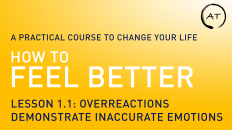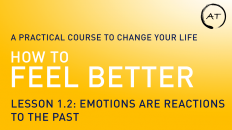The First Insight is that your emotions aren’t always accurate. Emotions play an important role in enriching our lives, but not every emotion represents reality. Overreactions are prime examples of when our emotions aren’t aligned with reality.
Let’s start by figuring out what an emotion is and where emotions come from.
Emotions come from an old system in the brain. When we were hunter-gatherers, the world was a dangerous place. One slip up when I’m hunting mammoths could kill me. My mind needs to make quick and decisive decisions to keep me alive. The risk of messing up at anything in this ancient world is my death.
With the consequences of mistakes so high, our minds developed a way to keep us safe: the emotion. Emotions are intense sensations that tell us what to do.
Each feeling you have has both a cause and a purpose. Every emotion gets brought up when your current situation is similar to the cause of the emotion. The mind brings you the emotion to serve the emotion’s purpose.
Emotions form when an event happens that results in a feeling. If I eat a red berry and it gives me a stomach ache, I develop the emotional fear of red berries.
The cause of the fear is that when I ate a red berry, I had a stomach ache. The purpose of the fear is to prevent me from having a stomach ache. The cause and purpose are different, but they both rely on a memory association between an event (eating a red berry) and a feeling. (the stomach ache).
So my red berry mishap has given me a fear of red berries. Totally cool! I’m going to avoid stomach aches now!
But what happens when my friend, Sarah, offers me a delicious red strawberry? Well, yours truly thinks that Sarah is trying to poison me. I get scared and angry. But Sarah just wanted me to enjoy a strawberry!
Clearly, my emotional response is not aligned with reality.
This sort of mix-up happens all the time in our lives. But there is a more serious issue with emotions than emotions just being inaccurate:
The emotional system treats every incident as a matter of survival.
Today, in our amazing society, how often is death the penalty for a mistake? Not often.
Your emotions will tell you that screwing up a spreadsheet could kill you. My guess is that you will live if you make a small mistake. Because modern life has removed the physical danger faced by our ancestors, our emotional system is out of date.
The good news is the Second Insight: you can correct inappropriate emotions. Before you get there, you’ll need to make sure you completely understand that emotions can be inappropriate.
Inappropriate emotions can happen for several reasons. Each reason can cement the First Insight in your mind.
To fully grasp that emotions aren’t always accurate or useful, look at the supporting truths:
- Overreactions demonstrate inappropriate emotions.
- Emotions are often reactions to the past, not to the present.
- Emotions can be caused by inaccurate assumptions.
- Emotions can conflict with each other.
- How to define when an emotion is inappropriate.
When you’re convinced, you are ready to learn that you can release emotions.


